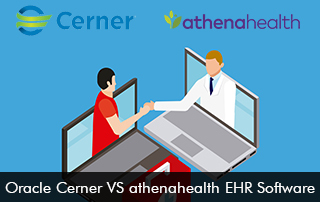Oracle Cerner EMR software and athenahealth software are the two prominent names in the electronic health records market in the USA. The two vendors have been quick to roll out new updates during the COVID-19 pandemic to support patient care. To simplify your decision-making process we will compare the two software giants in terms of functionality, ease of use, interoperability, and customer service.
About Oracle Cerner
Cerner was acquired by Oracle in 2022. The EHR vendor offers a suite of solutions to simplify clinical, administrative, and billing workflows. Oracle Cerner offers its users both onsite and offsite hosting that can be customized to meet unique practice requirements.
Functionalities offered by Oracle Cerner EMR Software
- Clinical documentation tools
- Patient portal platform
- Robust third-party integrations
- Mobile Chart Access
- Revenue Cycle Management (RCM)
- EHR network connections
- E-Rx
- Telehealth for remote care
- Practice analytics
- Population health management
- HIPAA-Compliant
- ONC-ATCB Certified
About athenahealth Software
The health IT vendor, athenahealth is known for its powerful solutions of Electronic Health Records (EHR) software, billing platform, and Revenue Cycle Management (RCM) services. It has five modules that allow users to manage the different aspects of their practice. These modules include; athenaComunicator, athenaCollector EMR Software, athenaClinicals EMR Software, athenaClarity, and athenaCoordinator. The cloud-based services are HIPAA Compliant to ensure privacy around the clock.
Key features present in athenahealth EHR
- Customizable documentation
- Automatic patient record sharing
- Mobile capabilities
- Voice solutions
- Revenue cycle services
- E-Rx
- Patient engagement tools
- Population health
- Telehealth platform
- HIPAA-Compliant
- Patient Portal
Functionality Analogy of the vendors
Both electronic health records software vendors offer a complete suite of solutions with practice management capabilities. They know that clinicians don’t want to spend time charting and documenting, hence offering strong voice recognition tools to simplify the documentation process. Oracle Cerner EHR Software and athenahealth EMR Software provide full-featured functionalities to their users.
Which EMR software vendor has a better UI?
In terms of program UI, a new report from KLAS has ranked athenahealth just above Oracle Cerner in terms of usability according to care managers, and healthcare providers at the point of care.
Users have reviewed athenahealth’s interface as intuitive and easy to navigate. Cerner users state that at times the software is difficult to navigate and requires help.
Integrations and Interoperability Comparison
Oracle Cerner and athenahealth EMR software are both committed to enhancing interoperability and integration options for their users. An interoperable environment means that data can be exchanged seamlessly with different systems to support care coordination.
Cerner EHR integrates effortlessly with EBSCO Nursing Resources, CHADIS, Enterprise Software, and CHRON Health Telemedicine. athenahealth software offers pre-built integrations for applications, diagnostic testing, and external health systems. The vendor also offers API and other tools for custom integrations.
Customer Support Assistance
Oracle Cerner offers 24/7 live customer support to its users, whereas athenahealth only offers online support during business hours.
Conclusion
If you want a user-friendly interface, and great reporting, and only need support during business hours, athenahealth EMR software is a robust solution. Cerner is the best pick for HDOs who require 24/7 assistance, extreme extensibility, and improved population health management features.
Finally, both vendors are top choices for streamlining daily tasks, and a free demo is encouraged for potential buyers to evaluate how the software system operates.







